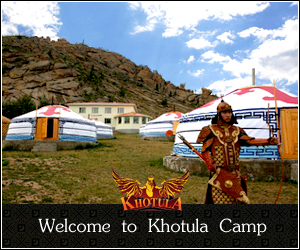Hakuho Wins Battle of Honor to Lift Cup
{mosimage}ON January 27 afternoon here, almost all Mongolians and all Japanese sumo fans watched the channel that showed sumo. After many years two yokozunas, both Mongolian as it happens, faced each other to decide who of them will have the honor to hold the Emperor’s Cup afterward.
ON January 27 afternoon here, almost all Mongolians and all Japanese sumo fans watched the channel that showed sumo. After many years two yokozunas, both Mongolian as it happens, faced each other to decide who of them will have the honor to hold the Emperor’s Cup afterward.
Honor was the key word as Hakuho and Asashoryu, both with just one loss in the whole basho, came on the ring to face each other. Hakuho, clearly the favorite with the Japanese, had to show that the return of the senior yokozuna did not affect his standing as the champion. For Asa, the icon of the Mongolian masses, it was a bid to regain a position lost temporarily because of reasons other than sumo prowess.
As in any sports event it was a clash also between the respective fans of the two champions. Fortunately Mongolians and Japanese do not have much chance of watching sumo together, as in any Hakuho-Asashoryu bout the support lines are too clearly drawn.
The initial rituals could hardly hide the tension. The face off actually was a relief. Hakuho got a good start and managed to grab Asashoryu’ belt. But the older yokozuna did not give up and also got his hands on his rival’s belt.
Asashoryu tried everything he could, raising hopes among his fans as he lifted Hakuho twice in the air but the coup de grace kept eluding him. The 22-year-old Hakuho never looked to be in mortal trouble and, then, suddenly he timed an over-arm throw just right to secure his third consecutive basho win.
The last victory was certainly the sweetest as the others had been achieved when his main challenger was out of action. Hakuho was naturally very proud and happy but the defeated Asashoryu was also not downcast. After all, a prolonged absence must mean something, and training is no substitute for top class competition.
In his post-match comments to the media, Hakuho said: “I just wanted to go at him strong. My sumo went exactly as I expected. I never thought I’d lose. I participated in the summer exhibitions and have been practicing hard this whole time. I was in top shape and there was no way I could allow someone returning after a lay-off to win the Emperor’s Cup. When I looked into his eyes across the starting lines, I reaffirmed to myself that I would not lose. I used my strength wisely and never in the course of the bout felt threatened.”
Hakuho’s Japanese wife gave a hint of the tensions that plague the home life of champions during a tournament. She told media, “We were always aware that this decisive bout might come, to the point that I didn’t even dare mention Asashoryu’s name during the basho.”
Asashoryu did not indulge in excuses or self-pity when he spoke to journalists. Accepting the loss in good grace, he commented, “We wanted the sumo to be good, and I gave it my all. It was a battle of strength. I’m not heartbroken. I just wasn’t strong enough in that particular bout. I definitely want and hope to beat him in the next basho.”
Soon after the yokozunas had spoken, journalists hurried to get some quotes from the sumo authorities about Asa’s performance. Katsuji Ebizewa, chairman of the Yokozuna Deliberation Council, told them, “In a match between yokozunas one has to lose. You can say that Asashoryu performed as well and fought as hard as he could. I’d like to see him continue to produce dignity, pride, and self awareness.”
Asa’s stable master Takasago commented on his ward’s performance thus. “It’s too bad. He did so well this past month to build up his body. I hope he takes good care of himself and approaches the Haru basho with the feeling and confidence that he’s going to win it.”
The basho with two yokozunas also had a good influence on audience rating and ticket sales. When television viewership figures were released they showed that they were 24.4% on an average during the January tournament. NHK, the principal sumo channel, said this was the highest rating in 10 years and the first time since the 22.5% in 2006 that the figure had crossed the 20% mark. The Japanese channel also revealed that the peak was reached on the final day when Asashoryu and Hakuho met each other.
The Japan Sumo Association said seven of the 15 days of the basho were totally sold out. This clearly helped the JSA to make some profit after two tournaments without Asashoryu which had left it in the red.
The two yokozunas were not the only wrestlers who made the tournament memorable, particularly for Mongolians. Others from the country, such as sekiwake Ama, 34-year-old veteran Kyokutenho, and Kakuryu impressed with their performance.
Ama is surely looking forward to an ozeki promotion though he ended the tournament with 9 wins and 6 losses. His claim would be that he defeated several ozekis, as well as Hakuho. His performance at the tournament has already earned him the shukunsho, the “fighting spirit prize”. Speaking after receiving the award, Ama said, “My physique needs to be bigger. I’m going to eat a lot more, practice a lot harder, and do my best in the next basho.”
Maegashira #8 Kakuryu also had an outstanding tournament, ending it with only 4 losses. He also got a prize, his first since his elite division debut. Two of the three prizes that are given to wrestlers in the elite divisions thus went to Mongolians.
Asasekiryu who lost his sekiwake title ended the tournament with 10 wins and 5 losses. Kyokutenho, the second oldest wrestler active after ozeki Kaio who is 35 years old, proved that he is still a force to reckon with, managing to win 10 bouts out of 15. The only Mongolian wrestler who did not win more than 8 bouts was the unfortunate maegashira #1 Tokitenku. He won 6 and lost 9. He could not achieve the 50% mark mainly because he faced some tough opponents in the upper half of the division.
In its formal post-basho summation, the Yokozuna Deliberation Council commented on the two yokozunas’ performance. Chairman Katsuji Ebizawa stated, “Asashoryu showed remorse, did his best, and I thought he fulfilled his responsibility as Yokozuna. I’m sure his dominance with Hakuho will continue for a while.”
Meanwhile Asashoryu plans to return to Mongolia to take some days off after an intense basho that will not be easily forgotten. He said that he would train hard not to lose the next tournament to his rival. Sumo fans now have to wait some weeks to see what happens in the March tournament.
The UB Post












